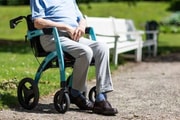Doctor warns against dangerous complication of eating chia seeds
By
Seia Ibanez
- Replies 1
Content Warning: This article contains a graphic image of an endoscopy, which may be unsettling for readers. Discretion is advised.
Chia seeds have become a popular superfood in recent years, lauded for their high antioxidant content and potential to improve digestion and ease constipation.
However, medical professionals issue a stern warning about a common mistake some people make when consuming these tiny nutritional powerhouses: eating them dry.
Dr Wendi Lebrett, a gastroenterologist at California’s UCLA Health, recently took to social media to caution against this practice.
'Chia seeds can absorb up to 27 times their own weight in water, so please don’t eat it dry, or you’ll be seeing a GI doctor soon,' she warned in her video online.

The reason for this is that when consumed without liquid, chia seeds can form a 'concrete-like mass in your digestive tract,’ leading to potential blockages.
This is due to the seeds' unique ability to absorb water and expand, a property that can be beneficial when they're properly prepared but potentially dangerous when they're not.
In her video, Dr Lebrett shared an image of a ball of chia seeds impacted in a person’s oesophagus—the passage that connects the mouth to the stomach. This alarming image underscores the potential dangers of consuming dry chia seeds.
To avoid such an incident, she advised drinking plenty of water while eating chia seeds and always soaking them first. This allows the seeds to expand and form a gel-like substance before they're consumed, preventing them from expanding inside your body and causing blockages.
Dr Lebrett also referred to a 2014 report published in the American Journal of Gastroenterology, which detailed the case of a 39-year-old man who ended up with impacted chia seeds in his oesophagus.
The man had swallowed a tablespoon of dry chia seeds and, 12 hours later, was having trouble swallowing.
He ultimately required an endoscopy to push the chia seeds into his stomach and resolve the blockage.
The tests confirmed a ‘gel of hydrated chia seeds’ had obstructed his oesophagus.
Left untreated, an oesophageal blockage can lead to difficulty swallowing, inability to eat, trouble breathing, and tearing of the oesophagus.
The report's authors said, 'Patients should never consume dry chia seeds. They can absorb many times their weight in water and expand and may become lodged in a patient’s oesophagus, especially if there is a history of swallowing problems.'
‘However, when used properly, chia seeds are safe. They should only be mixed with sufficient amounts of liquid to allow them to expand before consumption.’
You can watch Dr Lebrett’s video below:
Credit: @socalgastrodoc / TikTok
Doctors have already warned us to consume everything in moderation.
In a previous story, a report also revealed that while salt is essential for human health, thousands of Australians die yearly from illnesses due to high salt intake.
An independent Grattan Institute report highlighted the staggering impact salt has on the nation's health, including increased risk of hypertension, heart disease, stroke, and kidney disease. You can read more about it here.
 Have you experienced any issues with consuming chia seeds? Or do you have a favourite way to incorporate them into your diet? Share your experiences and recipes in the comments below.
Have you experienced any issues with consuming chia seeds? Or do you have a favourite way to incorporate them into your diet? Share your experiences and recipes in the comments below.
Chia seeds have become a popular superfood in recent years, lauded for their high antioxidant content and potential to improve digestion and ease constipation.
However, medical professionals issue a stern warning about a common mistake some people make when consuming these tiny nutritional powerhouses: eating them dry.
Dr Wendi Lebrett, a gastroenterologist at California’s UCLA Health, recently took to social media to caution against this practice.
'Chia seeds can absorb up to 27 times their own weight in water, so please don’t eat it dry, or you’ll be seeing a GI doctor soon,' she warned in her video online.

Dr Wendi Lebrett explained why it’s not good to consume dry chia seeds. Credit: @socalgastrodoc / TikTok
The reason for this is that when consumed without liquid, chia seeds can form a 'concrete-like mass in your digestive tract,’ leading to potential blockages.
This is due to the seeds' unique ability to absorb water and expand, a property that can be beneficial when they're properly prepared but potentially dangerous when they're not.
In her video, Dr Lebrett shared an image of a ball of chia seeds impacted in a person’s oesophagus—the passage that connects the mouth to the stomach. This alarming image underscores the potential dangers of consuming dry chia seeds.
To avoid such an incident, she advised drinking plenty of water while eating chia seeds and always soaking them first. This allows the seeds to expand and form a gel-like substance before they're consumed, preventing them from expanding inside your body and causing blockages.
Dr Lebrett also referred to a 2014 report published in the American Journal of Gastroenterology, which detailed the case of a 39-year-old man who ended up with impacted chia seeds in his oesophagus.
The man had swallowed a tablespoon of dry chia seeds and, 12 hours later, was having trouble swallowing.
He ultimately required an endoscopy to push the chia seeds into his stomach and resolve the blockage.
The tests confirmed a ‘gel of hydrated chia seeds’ had obstructed his oesophagus.
Left untreated, an oesophageal blockage can lead to difficulty swallowing, inability to eat, trouble breathing, and tearing of the oesophagus.
The report's authors said, 'Patients should never consume dry chia seeds. They can absorb many times their weight in water and expand and may become lodged in a patient’s oesophagus, especially if there is a history of swallowing problems.'
‘However, when used properly, chia seeds are safe. They should only be mixed with sufficient amounts of liquid to allow them to expand before consumption.’
You can watch Dr Lebrett’s video below:
Credit: @socalgastrodoc / TikTok
Doctors have already warned us to consume everything in moderation.
In a previous story, a report also revealed that while salt is essential for human health, thousands of Australians die yearly from illnesses due to high salt intake.
An independent Grattan Institute report highlighted the staggering impact salt has on the nation's health, including increased risk of hypertension, heart disease, stroke, and kidney disease. You can read more about it here.
Key Takeaways
- Experts warned that consuming dry chia seeds without liquid can lead to them forming a 'concrete-like mass' in the digestive tract.
- Dr Wendi Lebrett from UCLA Health advises against eating dry chia seeds and suggests they be soaked or consumed with plenty of water.
- A case detailed in the American Journal of Gastroenterology reported a man requiring an endoscopy to remove a blockage caused by dry chia seeds in his oesophagus.
- Chia seeds should always be mixed with sufficient amounts of liquid before consumption to prevent any risks associated with their expanding properties.







